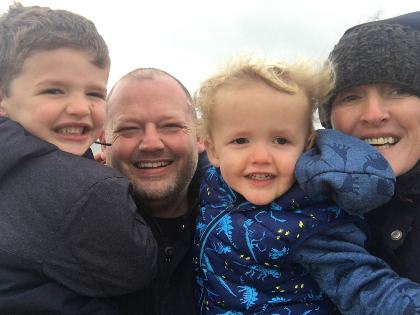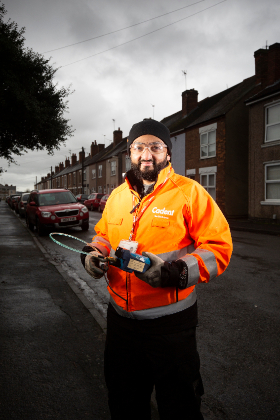- Nicola, Lee and their two young sons hadn’t realised their home was full of the deadly gas
- Ahead of Carbon Monoxide Awareness Week (23 to 29 Nov), they relive their ordeal
- Gas emergency service Cadent issues advice on how to reduce the risks
A Warwickshire family who almost lost their lives to carbon monoxide poisoning tell the story of their terrifying ordeal today in the hope it educates people to beware the ‘silent killer’.
Nicola Savory, her partner Lee Tonks and their two young sons (pictured) were said to be just an hour from tragedy when an emergency gas engineer called at their home in Bedworth.

They didn’t release their home was filled with carbon monoxide (CO), a deadly gas you cannot see, hear, smell or taste. It was leaking from a snapped boiler flue and they didn’t have a CO alarm.
Mo Dawood, an engineer from gas emergency service Cadent, knocked at the property after being called to a neighbour’s house, where a CO alarm was picking up low readings.
Following procedure, as he waited for someone to answer, he placed his detection reader through the letterbox. “The CO reading I got right then was so massive I couldn’t believe it,” said Mo.
The reading was nearly 600 parts per million (PPM) CO, which is deadly if exposure continues for just a few hours.
“No-one was answering so I gave the door a real bang and a lady [Nicola] eventually came to the door,“ said Mo.

“I could see straight away she had big red circles around her eyes, so I ordered her and everyone in the house to get out as quickly as possible.
“The dad [Lee] came to the door but didn’t look right. He said he’d been in bed because he had been out on a rugby do the night before and had had a few beers. He started wobbling and collapsed.”
Paramedics whisked the entire family to Coventry’s University hospital where they were treated for the effects of carbon monoxide inhalation.
Mo said: “When I think back, I remember that I’d finished my previous job earlier than expected, which meant I arrived on site sooner – that turned out to be so vital in this case. If I’d have got there any later, we might have been dealing with a different situation altogether.”
Today, Nicola urged people to follow Cadent’s safety advice – in particular, to make sure they get their boiler serviced every year and to buy audible, working CO alarms.
Her plea comes ahead of Carbon Monoxide Awareness Week, which runs from 23 to 29 November.
“Someone was looking down on us that day,” said Nicola, 40.
“I think about it a lot, when I look at my children [James, 5, and Harry, 2] and Lee.
“When we came back from hospital, and the children were finally asleep, both of us were crying.
“We realise how unbelievably lucky we were.
“It boggles my mind that we never had a carbon monoxide alarm in the first place.
“We had not long had a new boiler fitted and it probably fell off the radar.
“Until it affects you personally, you just think ‘it would never happen to me’.
“But it very nearly did and I would just ask everyone to learn from this, buy an alarm, or a few of them, and make sure you get that annual safety check on your appliances.”
Lee, 40, added: “If Mo hadn’t knocked on our door that morning we wouldn’t be here now, so we owe him everything.
“I’d been out the night before and thought I just had a bad hangover. I felt nauseous and light-headed, and as soon as I went outside I just collapsed.”
He added: “The shops must have quickly sold out of carbon monoxide alarms shortly after because my friends and family will have bought all of them! At a cost of just £10 to save your family’s life, it’s worth every penny.”
What is Carbon Monoxide and how to reduce the risks
Carbon monoxide occurs through incomplete combustion of fossil fuels. It’s a risk associated with gas boilers and appliances, but also the likes of wood-burning fires, barbecues and generators. There are around 40 deaths in England and Wales from carbon monoxide poisoning every year.
Known as ‘the silent killer’, you can’t see, smell, taste or hear it, but you can take simple steps to reduce the risks. Everything you need to know is at
www.cadentgas.com/co.
Key points are:
- Have your gas appliances installed and regularly serviced by an engineer you’ve confirmed is on the Gas Safe Register. These engineers are allowed to continue working in homes through lockdown and are following extra safety measures with regards to coronavirus.
- Ensure all chimneys and flues are regularly cleaned (annually).
- Fit audible carbon monoxide alarms within your home, around three metres from an appliance. And make sure you test these regularly.
- Knows the symptoms – which include headache, dizziness, breathlessness, nausea, collapse and loss of consciousness. Some people often describe early symptoms as being flu-like, or even like being hungover.
- Know other warning signs – which include gas flame appearing ‘floppy’ and burning orange or yellow rather than mostly blue, pilot light frequently blowing out, or there is soot or yellow-brown staining on or around an appliance.
- If you are worried there could be a leak in your property, call the National Gas Emergency Number 0800 111 999, day or night, immediately.